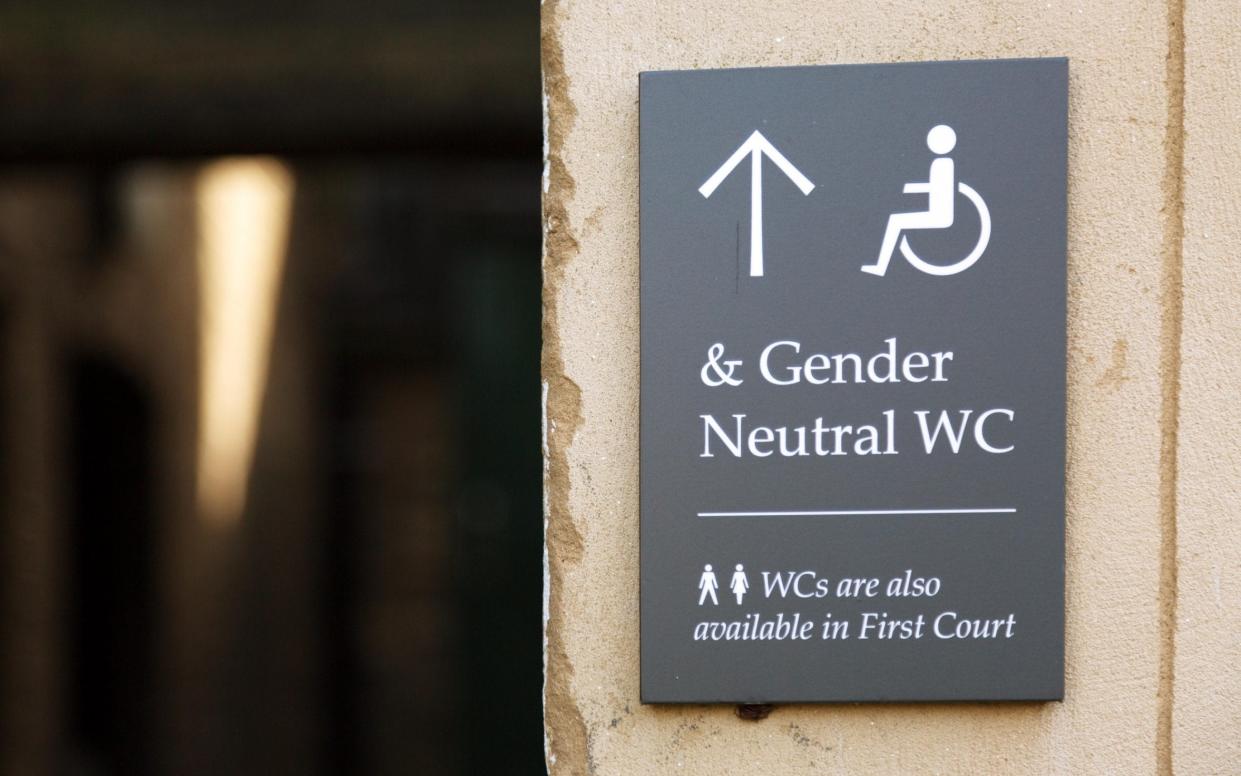Compulsory single-sex lavatories for all restaurants and offices under new laws

Single-sex lavatories will become a legal requirement for all new restaurants, bars, offices and shopping centres, the Government has announced.
Building regulations will be changed later this year to make it compulsory to provide separate facilities for men and women after an increase in the use of gender-neutral lavatories.
The law will apply to new non-residential buildings, but existing businesses could also be caught by the rules if they undergo major renovations.
It has recently become popular for restaurants, bars and other commercial spaces to provide gender-neutral lavatories rather than different facilities for women and men, but ministers said single-sex provision is necessary to alleviate safety, privacy and dignity concerns.
Writing for The Telegraph, Lee Rowley, the housing minister, said the Government wanted to challenge activists who have promoted gender-neutral facilities and support “what most people thought was common sense”.
He said the Government wants to ensure “that single-sex toilets, providing privacy, decency and space for both sexes, are not abolished for alternatives which might offer none of that – and make the whole process of using the loo even more inefficient.”
Looming general election
The policy will be seen by many as an attempt by Rishi Sunak to advertise his conservative credentials as he faces pressure to move the party to the right ahead of the general election.
The move comes after similar steps taken by the Government to protect women-only spaces, as public debate about transgender issues continues to make headlines.
Last month, it was announced that the NHS constitution will be changed to declare that sex is a matter of biology in a landmark shift against gender ideology.
Last year, the Government’s long-awaited first guidance for teachers on trans issues saw schools told to presume that a child cannot change gender.
The Old Vic theatre in London was criticised in 2019 after scrapping its male and female toilets and replacing them with gender-neutral facilities.
The theatre explained the change by saying the “self-selection” lavatories would allow attendees to avoid “responding to a label placed on you which you may not identify with”.
‘Better provision for women’
Kemi Badenoch, the women and equalities minister, said: “These regulations will guide organisations to design unisex and single-sex toilets, ending the rise of so-called ‘gender-neutral’ mixed sex toilet spaces, which deny privacy and dignity to both men and women.
“Today’s announcement will also create better provision for women so that our particular biological, health and sanitary needs are met.
“This is following our work last week limiting the use of mixed-sex wards in the NHS and demonstrates how this government is committed to ensuring single-sex spaces are protected for all.”
Current laws for new buildings that are not homes have general guidance about the provision of toilets. But after a recent consultation, ministers have decided to act to make what is expected more explicit.
The consultation highlighted concerns from women, the elderly and the disabled, who felt unfairly disadvantaged by gender-neutral lavatories where users share cubicle and hand-washing facilities as they often lead to increasing waiting in shared queues, decreased choice and less privacy and dignity.
‘Universal’ lavatories still allowed
Legally binding regulations will be reworded later this year to make clear that in new non-domestic buildings, different lavatories must be provided for men and women.
So-called “universal” self-contained lavatories, made up of a single lockable cubicle with hand-washing facilities, will still be allowed, providing there are also single-sex lavatories.
An exception will be made for when a building is so small that there is no space for two different sets of lavatories. In that scenario, a shared self-contained lavatory will be allowed.
There are also some new buildings which will be kept outside of the new rules, such as care homes. Schools, which have their own separate guidance, are also exempted.
It came as a leading industry group was scrutinised over guidance relating to whether self-identifying transgender women can use single-sex spaces.
The Chartered Institute of Personnel and Development (CIPD), which represents HR professionals, was singled out for advice that said it is “discrimination” to refuse a transgender person access to female-only facilities.
Maya Forstater, chief executive of gender critical group Sex Matters, said she plans to report the CIPD to the Government over its approach.
Avoiding ‘culture wars’
In his Telegraph article, Mr Rowley rejected the idea that the policy amounted to engaging in “culture wars” and criticism that ministers have not shown enough sensitivity to those who want to change gender.
Mr Rowley writes: “Whenever any minister talks about these kinds of issues, inevitably we get labelled with being ‘Culture Warriors’. That couldn’t be further from the truth.
“I have no interest in fighting any war on social issues. I want an open, tolerant and welcoming society. My first instinct is always to live and let live wherever possible.
“Yet, the ground beneath our feet on these issues is constantly shifting – pushed by unelected activists who try to move us in directions that the average person doesn’t support nor, often, which make sense. And, where it makes no sense, it is the job of a responsible Government to stop that happening. That is the exact opposite of a culture war.”
The CIPD, which is a charity, said its guidance “makes clear that employers should listen carefully to employees and seek legal advice where necessary if making decisions over the use of toilets and other facilities”.


